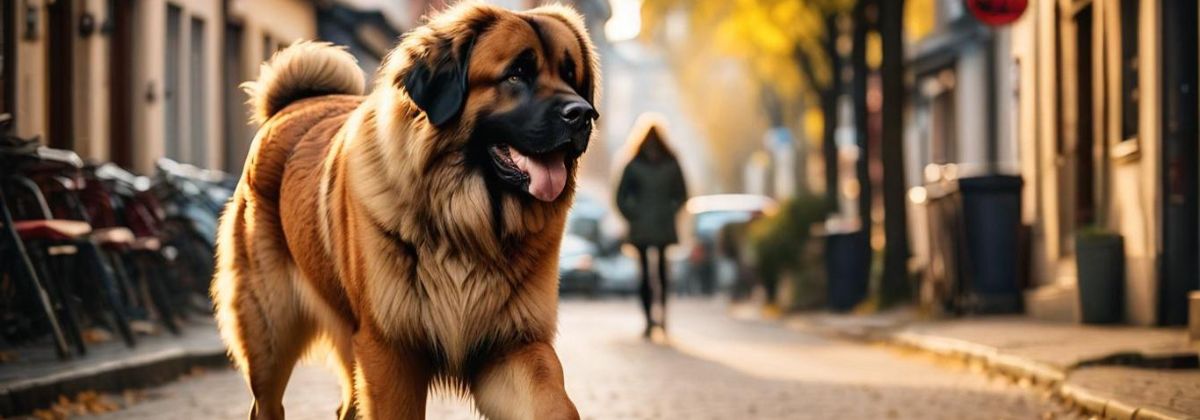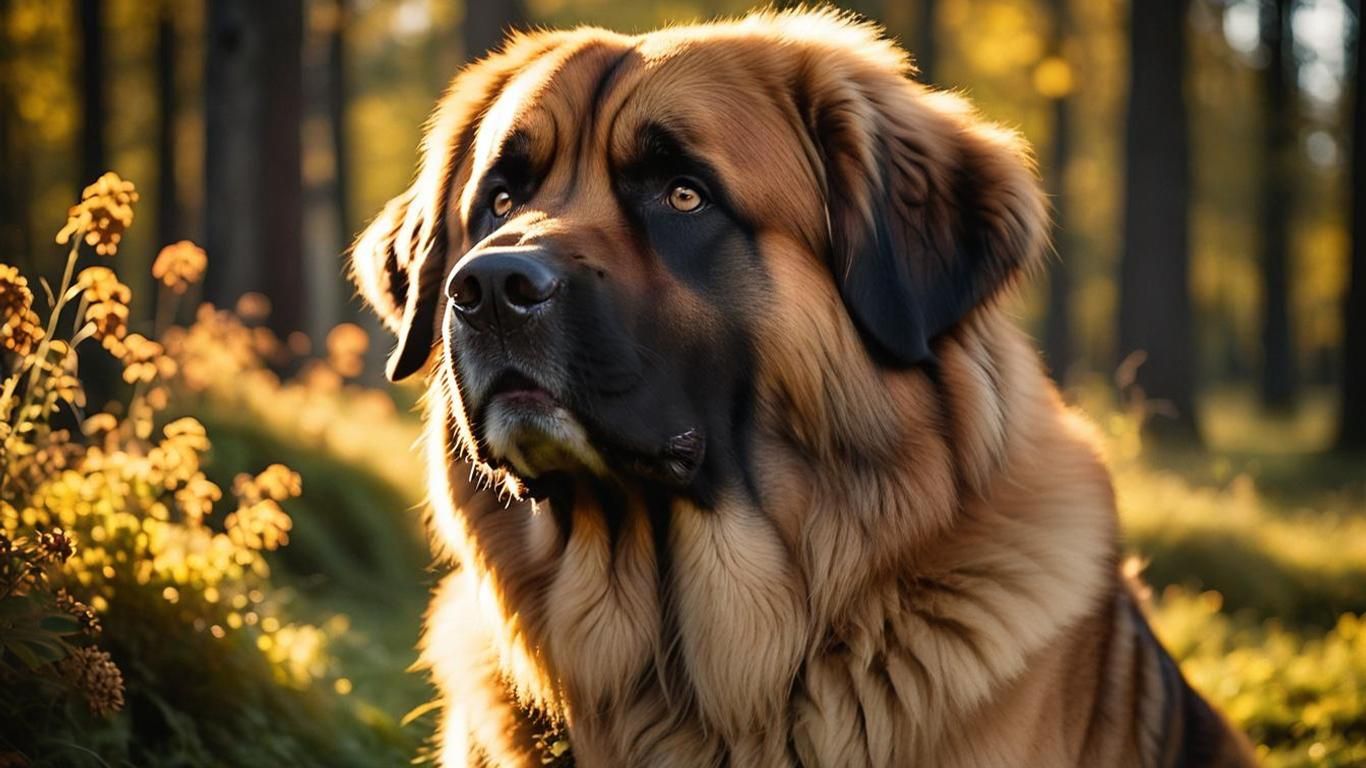08 Mar Leonberger Dogs: Majestic Companions with a Rich History
Imagine a dog that combines strength, gentleness, and a majestic presence – that’s the Leonberger. These dogs are more than just pets; they are faithful companions known for their impressive size, friendly nature, and unique history. Let’s explore the world of Leonbergers together!The History and Origin of the Leonberger Dogs
Leonberger dogs, with their majestic presence and gentle nature, have a history as rich and captivating as their appearance.
The story of the Leonberger begins in the mid-19th century in Leonberg, Germany. This breed was carefully crafted by intentionally crossing several large dog breeds, including Saint Bernards, Newfoundlands, and Pyrenean Mountain Dogs. The goal was to produce a dog that embodied strength, agility, and a friendly disposition.
Originally, Leonbergers were bred for practical purposes. Their impressive size and strength made them ideal for various roles, including working on farms and as draft animals. However, their most notable contribution was in water rescue missions. With a water-resistant double coat and powerful swimming abilities, Leonbergers became indispensable in saving at-risk lives in aquatic emergencies.
The breed gained recognition and popularity, leading to the establishment of the Leonberger Club of Germany in 1891. This marked a pivotal moment in the breed’s history, as it provided a platform for breed enthusiasts to collaborate, share knowledge, and establish breeding standards.
The two World Wars presented challenges for Leonbergers. The breed faced near extinction during these turbulent times due to the scarcity of resources and the impact on breeding programs. However, dedicated breeders and enthusiasts worked tirelessly to preserve and revive the Leonberger lineage.
In the post-war period, the Leonberger breed started to gain international recognition. The breed spread beyond Germany’s borders, capturing the hearts of dog lovers worldwide. Today, Leonbergers are cherished for their historical significance and role as loving family companions.
Leonbergers have become symbols of strength and nobility. Their striking appearance, characterized by a lion-like mane and expressive eyes, reflects the careful breeding that has created these magnificent animals.
Physical Characteristics of Leonberger Dogs
- Size and Stature: One must highlight their remarkable size to discuss Leonbergers. Also, these dogs are true giants, typically weighing between 100 to 170 pounds. Standing at the shoulder, male Leonbergers measure around 28 to 31.5 inches, while females are slightly smaller, ranging from 25.5 to 29.5 inches.
- Distinctive Coat and Coloration: Leonbergers boast a luxurious double coat that adds to their majestic appearance. The outer coat is medium to long, straight, and dense. Also, the undercoat is soft and thick. Their coat is water-resistant, inherited from their ancestors.
- Lion-Like Mane and Bushy Tail: One of the most iconic features of Leonbergers is their lion-like mane. The thick, flowing hair around their neck adds to their regal look. It provides a touch of historical significance, resembling the heraldic lion that was part of the Leonberger town crest. Additionally, Leonbergers have a bushy tail that completes their majestic appearance.
- Expressive Eyes and Ears: Leonbergers are known for their soulful and expressive eyes. Set well apart and ranging in colour from dark brown to light amber, their eyes reflect intelligence, gentleness, and a hint of mischief. The ears are moderately sized, hanging close to the head.
- Dewlaps and Wrinkles: Another attractive physical characteristic of Leonbergers is the presence of dewlaps – loose skin on their neck and throat. This feature adds to their overall regality.
- Built for Strength and Agility: Beyond their aesthetics, Leonbergers are built for strength and agility. Their powerful limbs and well-structured bodies make them versatile working dogs. Despite their size, they move with grace and agility, traits initially honed for their roles in various tasks, including water rescue missions.
Temperament and Personality
- Gentle Giants: A Friendly Disposition: Leonbergers are famous for their gentle and friendly nature, earning them the affectionate nickname of “gentle giants.” Despite their imposing size, their calm and amiable temperament makes them excellent family pets. Their innate patience and tolerance, especially towards children, set them apart as excellent companions for households of all sizes.
- Loyalty and Devotion: One of the standout characteristics of Leonbergers is their unwavering loyalty to their families. These dogs form strong bonds with their human companions, and their devotion knows no bounds. Whether it’s a quiet evening at home or an outdoor adventure, Leonbergers thrive on being an integral part of family activities.
- Sociable and Sociable: Leonbergers are social beings and enjoy being in the company of their family members. They tend to get along well with other pets. They are generally welcoming to strangers, making them excellent additions to households with multiple pets or frequently receiving guests. Their sociable nature contributes to their adaptability in various social settings.
- Protective Instincts: While their friendly disposition is evident, Leonbergers also possess protective instincts. Historically, these dogs were great for guarding and protecting. Today, that protective instinct remains, making them reliable family guardians. They are alert, ready to respond if they sense any potential threat.
- Intelligent and Trainable: Leonbergers exhibit a high intelligence level, making training them a rewarding experience. Early training and socialization are essential to ensure their intelligence is channelled appropriately, resulting in a well-mannered and well-adjusted adult dog.
- Affectionate Companions: Beyond their physical presence, Leonbergers are affectionate companions. They enjoy being close to their human family members, whether it’s lounging on the sofa or joining in outdoor activities.
- Adaptability to Different Environments: Leonbergers can adapt to various living environments despite their large size.
Grooming Needs of Leonberger Dogs
- Regular Brushing to Prevent Mats: Aim to brush your Leonberger a few times a week, mainly to areas prone to matting. Using a slicker brush or a comb with wide teeth can help remove loose hair and prevent the formation of mats.
- Addressing Shedding Seasons: Like many double-coated breeds, Leonbergers undergo shedding seasons during these times, typically in spring and fall, and their shedding increases.
- Bathing: Quality Over Quantity: Leonbergers do not require frequent baths, as their coat has natural oils that keep it healthy. Aim to bathe your Leonberger every two to three months or as needed. Use a high-quality dog shampoo that is gentle on their skin and coat. Be sure to rinse thoroughly to prevent any shampoo residue.
- Coat Drying Techniques: After a bath or if your Leonberger gets wet, ensure thorough drying to prevent skin issues. Pay attention to the undercoat, as dampness in this area can lead to skin problems. Avoid leaving the coat damp, especially in colder weather.
- Nail Care and Ear Cleaning: Regular nail trimming is essential for Leonbergers, as their large size puts extra pressure on their nails. Use a dog nail clipper or grinder and trim the nails every few weeks, taking care not to cut into them quickly.
- Mishka Professional Grooming: While regular at-home grooming is crucial, seek professional grooming assistance periodically. Professional groomers can provide services such as coat trimming, especially around the paws and ears, and address any specific grooming needs your Leonberger may have.
- Teeth Cleaning for Oral Health: Don’t forget about dental care. Brush your Leonberger’s teeth regularly to maintain good oral health. Use a dog-friendly toothbrush and toothpaste, and introduce this routine from a young age to make it more comfortable for you and your canine companion.
Common Health Issues
- Elbow Dysplasia: Elbow dysplasia affects the elbow joint in dogs and can cause arthritis. To prevent it in Leonbergers, monitor their weight, provide a balanced diet, and avoid excessive exercise during their growth phase.
- Heart Conditions: Leonbergers may be predisposed to certain heart conditions, such as dilated cardiomyopathy. A healthy diet and exercise are also effective in maintaining cardiovascular health.
- Osteosarcoma: This is a type of bone cancer. Early detection is crucial for treatment success. Owners should monitor for signs of lameness, swelling, or pain and seek prompt veterinary attention if any unusual symptoms arise.
- Hypothyroidism: Hypothyroidism is a condition where the thyroid gland doesn’t produce enough hormones, leading to various health issues. Weight gain, lethargy, and skin issues are the common symptoms. Regular blood tests can aid in the diagnosis and treatment of hypothyroidism
- Bloat (Gastric Torsion): Bloat is a serious and potentially life-threatening condition that can affect large, deep-chested breeds like Leonbergers. Feeding smaller, frequent meals, avoiding vigorous exercise after meals, and monitoring for signs of bloating (restlessness, abdominal distension) can help reduce the risk.
- Eye Conditions: Leonbergers are susceptible to certain eye conditions, such as cataracts and progressive retinal atrophy (PRA). Regular eye checkups by a veterinary ophthalmologist can aid in early detection and control of these conditions.
- Cruciate Ligament Rupture: The cruciate ligament in the knee joint can be prone to injury in Leonbergers. So, maintaining a healthy weight and avoiding excessive, high-impact activities can help reduce the risk of cruciate ligament issues.
The Last Word
Leonberger dogs are not just pets but loyal companions embodying a perfect blend of strength and gentleness. Their rich history, coupled with their unique characteristics, makes them a delightful addition to any family. Consider the joy and love a Leonberger can bring into your life, and you’ll understand why they hold a special place in the hearts of dog enthusiasts.





Sorry, the comment form is closed at this time.